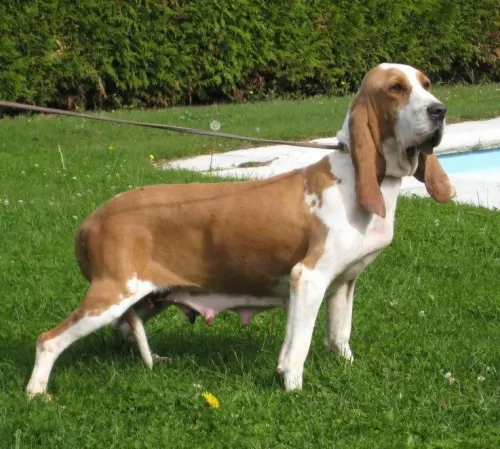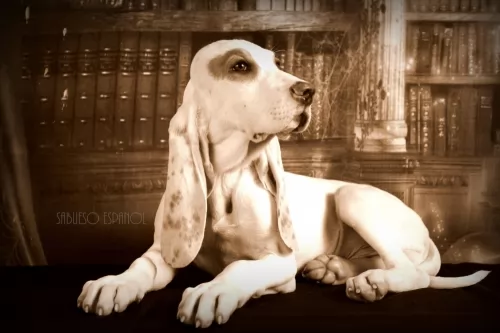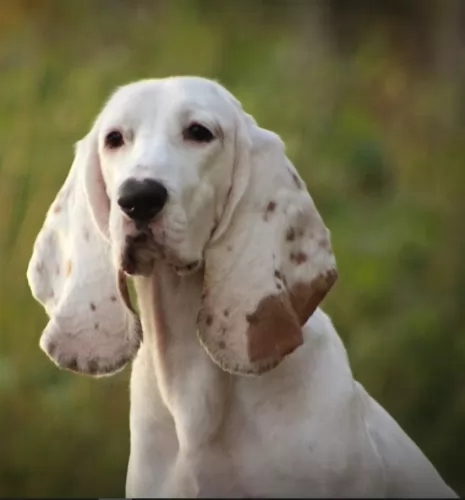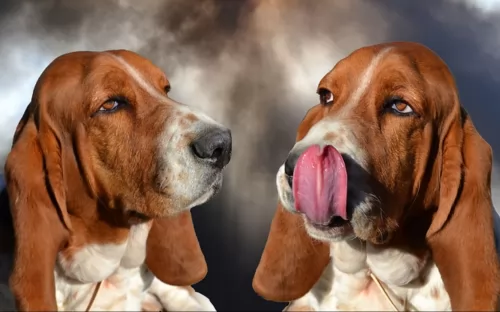 Petzlover
Petzlover Sabueso Espanol is originated from Spain but Spitz is originated from Russia. Sabueso Espanol may grow 12 cm / 4 inches shorter than Spitz. Sabueso Espanol may weigh 15 kg / 33 pounds lesser than Spitz. Sabueso Espanol may live 4 years less than Spitz. Sabueso Espanol may have less litter size than Spitz. Sabueso Espanol requires Low Maintenance. But Spitz requires Moderate Maintenance
Sabueso Espanol is originated from Spain but Spitz is originated from Russia. Sabueso Espanol may grow 12 cm / 4 inches shorter than Spitz. Sabueso Espanol may weigh 15 kg / 33 pounds lesser than Spitz. Sabueso Espanol may live 4 years less than Spitz. Sabueso Espanol may have less litter size than Spitz. Sabueso Espanol requires Low Maintenance. But Spitz requires Moderate Maintenance
 The Sabueso Español is a Spanish Scenthound, hailing from the Iberian Peninsula, Spain. Beyond Spanish borders, this dog is virtually unknown.
The Sabueso Español is a Spanish Scenthound, hailing from the Iberian Peninsula, Spain. Beyond Spanish borders, this dog is virtually unknown.
There isn’t much on its origins but it is believed that it may have developed from the bloodhound. The dog has been used for hundreds of years to hunt down wild boar, deer and all kinds of game. To this day it is essentially a hunting dog and not particularly used as a pet.
When he is on the hunt, he uses his baying bark to communicate with the pack. The dog is recognised by the UKC under the category ‘Scent Hound’.
 A spitz is not a breed of dog, but rather a “group or family” of dogs that has its roots in Germany. Within this family there are a variety of breeds that were bred for very specific purposes by people in many different parts of the world. The spitz family can be toy dog size up to vey large. Examples run from the Pomeranian to the Canadian Eskimo Dog.
A spitz is not a breed of dog, but rather a “group or family” of dogs that has its roots in Germany. Within this family there are a variety of breeds that were bred for very specific purposes by people in many different parts of the world. The spitz family can be toy dog size up to vey large. Examples run from the Pomeranian to the Canadian Eskimo Dog.
The Spitz family dogs share the look of thick, long fur and pointed muzzles, ears and curly tail. Despite their German name, they are thought to originally be of East Asia or Artic descent. Most of today’s spitz are from Siberia’s Artic region, first described in 1788 and in English in 1792. Spitz have been bred for three types of jobs depending upon where they were developed. These jobs included pulling, herding and hunting.
There are very powerful and large Spitz breeds that pull or hunt large game. Examples of these breeds are the Swedish Elkhound, the Akita Inu, the Norwegian Elkhound and the Karelian Bear Dog. The smaller sized breeds like the Samoyed hunted small mammals and birds, while the Finnish Lapphund, Lapponian Herder, and Swedish Lapphund herded, hunted and pulled small sleds.
The three largest spitz also pulled sleds throughout the 17th and 18th centuries. In most places the Canadian Eskimo Dog, the Alakan Malamute and the Greenland dog were used in sled racing and fur trapping while in Canada and Alaska the Siberian Husky was used for the same things.
Recently there have been genetic tests that show a large number of dogs that are considered Spitz type so share many strong ancestral ties and DNA similarities with wild wolves. It is now believed that a lot of these breeds were intentionally mated with wolves and some were accidental. Both domestic and wild dogs are included in this history.
Most spitz are made for cold weather, even today’s lapdogs, like the Pomeranian, do not do well in hot climates.
 Known also as the Spanish Hound, this medium-sized dog stands at between 47 and 58cm in height ad weighs 23 to 25kg.
Known also as the Spanish Hound, this medium-sized dog stands at between 47 and 58cm in height ad weighs 23 to 25kg.
The dog has very long ears, the eyes are amber colored and the long tail is thin ad whip-like. The coat is short and smooth and is mostly white with orangey, lemon or reddish brown patches.
People think that because these dogs are such excellent hunting dogs, they can't be a good pet, but they are calm and loving, making an excellent companion dog.
He is also good with children in the home. He will just need to be trained and socialized if you want him to be well mannered and obedient as he is independent and can be stubborn.
 Most of the spitz breeds share a “look” that includes erect ears, stocky heavy, usually double coats, a pointed muzzle, thick, fluffy ruffs and a heavy curled tail carried high over the body. Build for northern climates they are insulated by a undercoat that is waterproof and dense and a less dense topcoat. Their ears are small to prevent frostbite and their paws have thick fur to protect them in the frigid, icy terrain.
Most of the spitz breeds share a “look” that includes erect ears, stocky heavy, usually double coats, a pointed muzzle, thick, fluffy ruffs and a heavy curled tail carried high over the body. Build for northern climates they are insulated by a undercoat that is waterproof and dense and a less dense topcoat. Their ears are small to prevent frostbite and their paws have thick fur to protect them in the frigid, icy terrain.
Many still have wolf-like looks and tendencies. Some are very difficult to train to be companions – the Akita, Chow and especially the Karelian Bear Dog – fall into this category. Many mixed breed dogs are also considered members of the Spitz family. These dogs are easy to recognize as spitz because of these physical characteristics
 The attractive Sabueso Español is a calm, amicable, sweet dog that is loving towards his human owners. He is good with children but would prefer older children who know how to be kind and gentle towards him.
The attractive Sabueso Español is a calm, amicable, sweet dog that is loving towards his human owners. He is good with children but would prefer older children who know how to be kind and gentle towards him.
He isn’t aggressive and will get on well with other dogs in the house too. He is essentially an outdoor dog and will love nothing more than to have his family involved with him with activities outside.
If you’re looking for a great pet and companion for home and outdoor life, this dog is a superb choice.
 The Sabueso can live to be 12 years of age, but it is still good to be aware of typical dog illnesses that he can succumb to.
The Sabueso can live to be 12 years of age, but it is still good to be aware of typical dog illnesses that he can succumb to.
Hound dogs with floppy ears are known for getting ear infections. This is because floppy eared dogs don’t get the right amount of air circulation, and excess wax, dirt and moisture cause problems within the ear.
Excess body fat with a dog can create problems for your dog. Obesity is common in all dogs and dogs of all ages. Dogs that are obese don’t want to exercise. Obesity can cause a host of problems with your dog and even reduce his lifespan.
 It is a little harder to characterize the health issues of a family of dogs than it is a .will overheat in hot climates due to their double coats. Here are some propensities of dogs in the Spitz family.
It is a little harder to characterize the health issues of a family of dogs than it is a .will overheat in hot climates due to their double coats. Here are some propensities of dogs in the Spitz family.
• Thrombopathia bleeding disorder with the risk of a hemorrhage, platets don’t clot.
• Larger breeds are affected by Elbow and Hip dysplasia that can cause arthritis and lameness.
 The short coat of the Sabueso Español makes him a low maintenance dog. and a brush twice a week is enough to keep his coat in tip top condition. As you brush him, make sure to check for any odd, new lumps you come across.
The short coat of the Sabueso Español makes him a low maintenance dog. and a brush twice a week is enough to keep his coat in tip top condition. As you brush him, make sure to check for any odd, new lumps you come across.
Check inside his ears, take a look at his eyes and make sure they’re bright and clear.
Look inside his mouth. He has no way of telling you if he has a rotten tooth causing him pain, and he relies on you to check on this for him.
Provide him with a dry, warm, comfortable bed.
These dogs are known for their stamina and energy and will ideally suit a home on a large property and not a small property in the city. They need lots of open spaces and plenty of exercise. They love long walks, preferably vigorous hikes, swimming and ball and rope games.
Ensure he is neutered or spayed if you want to avoid puppies.
Make sure his vaccinations are up to date to prevent deadly canine diseases.
Your Sabueso Espanol needs a nutritious diet if he is to remain healthy and happy. Commercially manufactured dog foods can be a good choice if you go for the high quality ones packed with vitamins and minerals. They can be convenient and well balanced. To provide your dog with some variety, provide him with some home-made food added into the dry kibble from time to time. No need to make home-made food all complicated and involved. Simply boil chicken, brown rice, sweet potatoes, carrots and spinach together, chopping it all up, and adding little bits of this to your dog's dry kibble twice a week. This will keep him happy and healthy. Try to include a bit of raw meat occasionally and never let your dog be without a constant source of fresh, cool water.
 1Feeding the puppy The Spitz family has high energy needs but in a slow-release so they need protein more than grain. Puppies should be fed 3-4x a day in small meals. Don’t overfeed them.
1Feeding the puppy The Spitz family has high energy needs but in a slow-release so they need protein more than grain. Puppies should be fed 3-4x a day in small meals. Don’t overfeed them.
2.Feeding the adult – The Spitz type dog stores their energy to use in extended periods when working or playing. They will become obese if overfed or if they don’t get enough exercise. Feed 2-3X a day in small or medium sized meals, even the larger breeds because of their storage of calories.
4. Games and Exercises – Having been bred for endurance and stamina most Spritz breed need plenty of exercise, lots of space and lots of play. They love to run, jog, or play games. They are outdoors types who love to hike, and run or walk for long times over long distances. They are great in cold, wet weather but not so good in the heat. How much exercise they need depends on the size and history of the specific breeds. Most love to play with other dogs, so dog parks and dog day care can both be good choices for most of them. Agility, barnhunt, field trials, pulling games are all good choices.